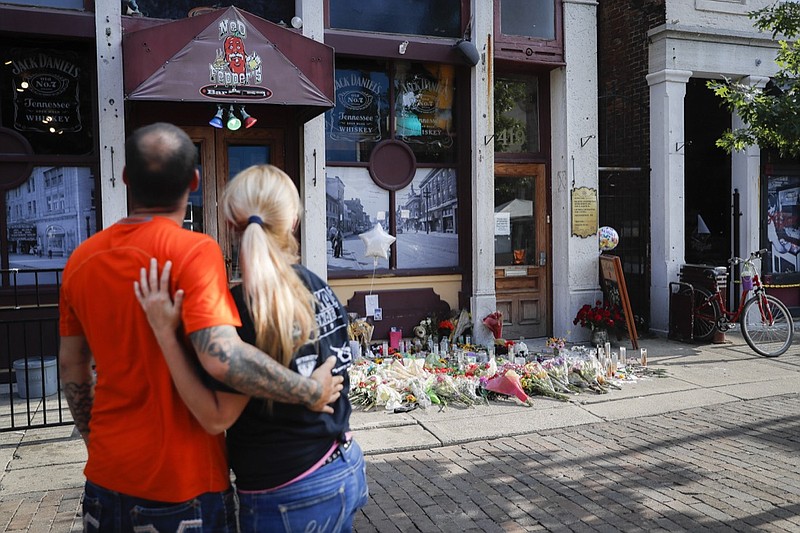Q. My family wants to contribute in some way to support victims' families at the mass shootings last week. What advice may BBB provide?
A. The Better Business Bureau joins with the nation in mourning the tragic losses in El Paso, Texas, and Dayton, Ohio, over this past weekend.
After a terrible and very public tragedy such as a mass shooting, wildfire or other natural disaster, or an accident, people want to help in any way possible, and that often means contributing to fundraisers to help the survivors and the families of the victims. Sadly, scammers often take advantage of these moments of vulnerability to deceive donors. In addition, there are often campaigns set up by well-meaning individuals who may or may not be directly connected to the tragedy.
BBB Wise Giving Alliance, www.give.org urges donors to give thoughtfully and avoid those seeking to take advantage of the generosity of others. Here are BBB WGA's tips for trusted giving:
1. Thoughtful giving: Visit Give.org to check charity ratings and verify if a charity meets the BBB Standards for Charitable Accountability. Take the time to check out the charity to avoid wasting your generosity by donating to a questionable or poorly managed effort. The first request for a donation may not be the best choice. Be proactive and find trusted charities that are providing assistance.
2. Crowdfunding: Keep in mind that some crowdfunding sites do very little vetting of individuals who decide to post for assistance after a tragedy or a disaster, and it is often difficult for donors to verify the trustworthiness of crowdfunding requests for support.
The largest online fundraising platform is GoFundMe, a BBB Accredited Business. In the wake of recent natural disasters and tragedies, GoFundMe reminded donors that they are monitoring campaigns and that their GoFundMe Guarantee helps protect donations to make sure funds go to the right place. If funds are misused, they will refund affected donations. Donors and beneficiaries in the United States and Canada can submit claims through the site.
If you have a question or want to know more about a campaign before you donate, reach out to the GoFundMe team or campaign organizer. To reach the campaign organizer, just click on the envelope next to the campaign organizer's name on the campaign page. There is also a link on each campaign page to "Report Campaign" if you do not get answers to a question or have other concerns.
3. Respect for victims and their families: Organizations raising funds should get permission from the families to use either the names of the victims and/or any photographs of them. Some charities raising funds for the victims of previous shootings did not do this and were the subject of criticism from victims' families.
4. Government registration: About 40 of the 50 states in the U.S. require charities to register with a state government agency (usually a division of the State Attorney General's office) before they solicit for charitable gifts. If the charity is not registered, that may be a significant red flag. If an organization is claiming to be a charity and they aren't registered, that's a red flag.
5. How will donations be used? Watch out for vague appeals that don't identify the intended use of funds. For example, how will the donations help victims' families? Also, unless told otherwise, donors will assume that funds collected quickly in the wake of a tragedy will be spent just as quickly. See if the appeal identifies when the collected funds will be used.
6. What if a family sets up its own assistance fund? Some families may decide to set up their own assistance funds. Be mindful that such funds may not be set up as charities. Also, if collected monies are received and administered by a third party such as a bank, CPA, or lawyer this will help provide oversight and ensure the collected funds are used appropriately (paying for funeral costs, counseling, and other tragedy-related needs).
7. Advocacy organizations: Tragedies that involve violent acts with firearms can also generate requests from a variety of advocacy organizations that address gun use. Donors can support these efforts as well, but note that some of these advocacy groups are not tax exempt as charities. Also, watch out for newly-created advocacy groups that will be difficult to check out.
8. Online caution: Never click on links to charities on unfamiliar websites or in text messages or email. These may take you to a look-alike website where you will be asked to provide personal financial information, or may download harmful malware onto your computer. Don't assume that charity recommendations on social media have already been vetted.
9. Financial transparency: After funds are raised for a tragedy, it is even more important for organizations to provide an accounting of how funds were spent. Transparent organizations will post this information on their websites so that anyone can find out without having to wait until the audited financial statements are available sometime in the future.
10. Newly-created v. established organizations: This is a personal giving choice, but an established charity will more likely have the capacity and experience to address the situation quickly and also have a track record that can be evaluated. A newly-formed organization may be well-meaning, but will be difficult to check out and may not be well managed. News reports may help identify responding charities but are not a guarantee that the organizations will use donations effectively.
11. Tax deductibility: Not all organizations collecting funds in the U.S. to assist after a tragedy are tax exempt as charities under section 501(c)(3) of the Internal Revenue Code. Donors can support these other entities, but keep this in mind if they want to take a deduction for federal income tax purposes. In addition, contributions that are donor-restricted to help a specific individual or family are not deductible as charitable donations, even if the recipient organization is a charity.
Jim Winsett is president of the Better Business Bureau in Chattanooga.

